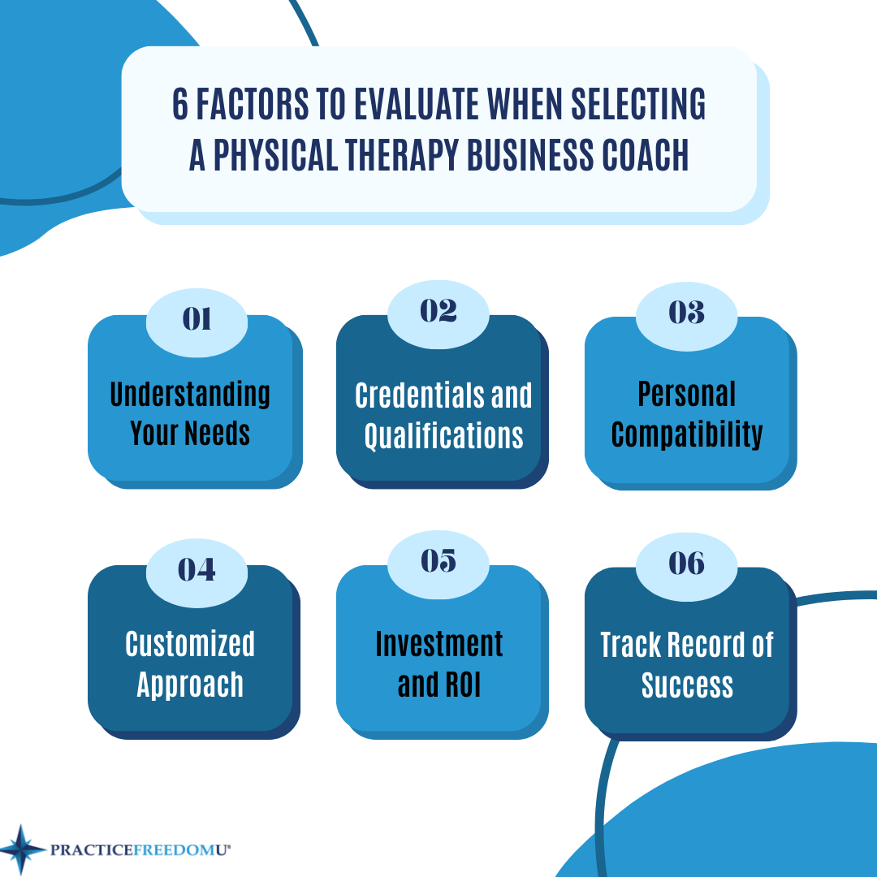In the dynamic field of healthcare, success isn’t just about providing excellent care to patients; it’s also about running a thriving business. However, many physical therapists find themselves grappling with the intricacies of business management.
Last week, we explored how having the expertise of a physical therapy business coach can be invaluable in overcoming these challenges and propelling your practice towards success. This week, our focus is on finding the right physical therapy business coach. In this article, we’ll delve into the essential steps to finding the perfect fit for your practice, ensuring that you’re equipped with the insights and tools needed to make informed decisions and embark on a transformative coaching journey tailored to your unique needs and aspirations (PPS Impact).

Understanding Your Needs
In the journey towards finding the right coach, the first step is gaining a deep understanding of your practice’s needs. This involves:
- Identifying Areas for Improvement
- Setting Clear Goals
- Importance of Goal Clarity
Begin by conducting a comprehensive assessment of your practice. Identify the areas where you feel there is room for improvement or where you face challenges. This could range from financial management and operational efficiency to marketing strategies and patient retention.
Once you’ve identified the areas for improvement, the next step is to set clear and specific goals. Define what success looks like for your practice in each of these areas. Whether it’s increasing revenue by a certain percentage, expanding your client base, or improving patient satisfaction, setting concrete goals will provide direction and focus.
Clarity in your goals is paramount to the success of your coaching journey. Clear goals serve as a roadmap, guiding both you and your coach towards actionable steps and measurable outcomes. They provide motivation, keep you accountable, and help you stay on track even when faced with challenges. Without clear goals, it’s easy to veer off course or lose sight of what you’re working towards. Therefore, taking the time to articulate and refine your goals ensures that you and your coach are aligned in your pursuit of success.
Credentials and Qualifications
When choosing a physical therapy business coach, their credentials and qualifications play a crucial role in ensuring their expertise and credibility. Here’s why they matter:
- Importance of Certifications
- Evaluating Educational Background
- Recognizing Industry Awards and Recognition
Certifications in business coaching, healthcare management, or related fields provide validation of a coach’s expertise and commitment to professional development. Look for coaches who hold recognized certifications from reputable organizations. These certifications demonstrate that the coach has undergone rigorous training and adheres to ethical standards in their practice.
Analyze the coach’s educational background to gain insight into their knowledge and expertise. Look for coaches who have relevant degrees or advanced training. A solid educational foundation indicates a deeper understanding of the principles and strategies applicable to coaching private practices.
Industry awards and recognition can further validate a coach’s credibility and success within the field. Pay attention to any awards or accolades they have received, as well as their involvement in professional associations or societies. Coaches who have been recognized by their peers or industry organizations are likely to have a proven track record of excellence and commitment.
Personal Compatibility
The relationship between you and your coach is a critical factor in the success of your coaching journey. (Forbes). Here’s why personal compatibility matters:
- Building a Strong Relationship
- Assessing Communication Styles
- Compatibility During Initial Consultation
Effective coaching relies on a strong and trusting relationship between the coach and the client. Look for a coach with whom you feel comfortable and confident sharing your challenges, goals, and aspirations. Building a strong rapport ensures open communication, mutual respect, and a supportive environment for growth and development.
Consider how well your communication styles align with those of your potential coach. Effective communication is essential for clarity, understanding, and collaboration. Assess whether the coach’s style resonates with your own preferences and whether they actively listen, provide constructive feedback, and communicate clearly and effectively.
Take advantage of the initial consultation or discovery call to assess compatibility with potential coaches. Pay attention to how well you connect with them on a personal level, as well as how they respond to your questions and concerns. Use this opportunity to gauge whether there is a natural rapport and whether you feel confident in their ability to support you on your coaching journey.
Customized Approach
Every physical therapy practice is unique, and a one-size-fits-all approach to coaching may not yield optimal results. To understand why a customized approach is essential, consider these points:
- Tailoring Coaching Approaches
- Developing a Personalized Action Plan
- Examples of Customized Coaching Strategies
- Implementing targeted marketing campaigns to attract your ideal client demographic
- Developing streamlined operational processes to improve efficiency and productivity
- Implementing revenue optimization strategies to maximize profitability
- Enhancing leadership and team-building skills to foster a positive workplace culture
- Implementing patient engagement initiatives to improve satisfaction and retention
A good business coach will tailor their coaching approaches to suit the specific needs, goals, and challenges of your practice. They will take the time to understand your practice’s unique strengths and weaknesses, as well as your vision for the future. By customizing their coaching strategies, they can provide targeted guidance and support that resonates with your practice’s context and circumstances.
Central to a customized approach is the development of a personalized action plan. Your coach will work closely with you to identify key areas for improvement and define clear, achievable goals. Together, you’ll collaborate to create a step-by-step action plan that outlines specific tasks, milestones, and timelines. This personalized roadmap serves as a guide for implementing strategies and tracking progress towards your goals.
Customized coaching strategies may vary depending on your practice’s unique needs and goals. Examples include:
These examples illustrate how a customized approach allows your coach to address specific challenges and capitalize on opportunities that are unique to your practice. By tailoring their strategies to your practice’s individual context, a physical therapy business coach can help you achieve sustainable growth and success.
Investment and ROI
Investing in a coaching service is a significant decision that requires careful consideration of the costs and potential return on investment (ROI). Key to note is:
- Cost vs. Value Proposition
- Maximizing Return on Investment
- Strategies for Investment in Business Coaching
- Set clear goals and expectations: Define specific, measurable goals for your coaching journey, and communicate them clearly to your coach. This ensures alignment and focus on achieving meaningful outcomes.
- Develop a realistic budget: Establish a budget for your coaching investment based on your practice’s financial resources and priorities. Be realistic about what you can afford while still ensuring that you’re investing in high-quality coaching services.
- Research and due diligence: Take the time to research and evaluate potential coaches thoroughly. Look for coaches with a proven track record of success, relevant experience, and a strong reputation within the industry.
- Negotiate terms and agreements: Review coaching contracts and agreements carefully, paying attention to terms, fees, and expectations. Negotiate terms that align with your needs and ensure clarity and transparency in the coaching relationship.
When evaluating the cost of hiring a business coach, it’s essential to consider the value proposition they offer. While the upfront cost may seem significant, weigh it against the potential benefits and long-term value that coaching can provide for your practice. Look for coaches who offer a clear value proposition, demonstrating how their expertise and guidance can lead to tangible improvements in your practice’s performance, profitability, and overall success.
To maximize the ROI of your investment in business coaching, focus on implementing the strategies and recommendations provided by your coach (U.S. Chamber of Commerce). Take proactive steps to apply what you’ve learned, overcome challenges, and achieve your goals. Additionally, prioritize open communication with your coach, providing feedback, asking questions, and seeking clarification when needed. By actively engaging in the coaching process and leveraging the support and guidance provided, you can optimize the return on your investment and accelerate your practice’s growth and success.
Consider the following strategies to make the most of your investment in business coaching:
By implementing these strategies, you can make a well-informed investment in business coaching that yields significant returns for your physical therapy practice.
Track Record of Success
Assessing a physical therapy business coach’s track record of success is crucial in determining their ability to help your practice thrive. Here’s why it matters:
The track record of success demonstrates a coach’s effectiveness in helping physical therapy practices achieve their goals and overcome challenges. By understanding the significance of their past successes, you can gain confidence in their ability to deliver tangible results for your practice. Look for coaches who have a proven track record of helping practices like yours achieve meaningful growth and improvement.
- Gathering Testimonials and References
- Indicators of Successful Coaching Outcomes
- Increased revenue and profitability: Look for evidence of revenue growth and improved financial performance as a result of coaching.
- Enhanced operational efficiency: Assess whether the coach’s guidance has led to streamlined processes, improved workflows, and increased productivity within the practice.
- Improved patient satisfaction and retention: Consider indicators such as patient feedback, reviews, and retention rates to gauge improvements in patient experience and satisfaction.
- Personal and professional growth: Evaluate whether the coach’s support has resulted in personal and professional development for practice owners and staff, such as improved leadership skills, communication, and teamwork.
One of the most reliable ways to assess a coach’s track record is by gathering testimonials and references from past clients. Testimonials provide firsthand accounts of the impact the coach has had on other practices, highlighting their strengths, areas of expertise, and the outcomes achieved under their guidance. Additionally, reaching out to references allows you to ask specific questions and gain insights into their coaching experience and the results they’ve achieved.
There are several key indicators that can help you assess the success of a physical therapy business coach’s outcomes, including:
By examining these indicators of successful coaching outcomes, you can gain a comprehensive understanding of the coach’s impact and determine whether they are the right fit for your practice’s needs and goals.
Your Physical Therapy Practice with Practice Freedom U
At Practice Freedom U, our focus is on providing valuable insights and support for the growth and success of your practice. We recognize the diverse challenges faced by practice owners, ranging from effective time management to client acquisition and staff retention. Our coaching approach is not a one-size-fits-all solution but rather a tailored partnership designed to address your specific needs and business stage.
In our Executive Coaching program, we empower practice owners to navigate the complexities of the healthcare landscape, emphasizing growth and enhanced profitability. Guided by experienced coaches with extensive industry knowledge, this program offers personalized advice and support across various facets of practice management. From developing a strategic vision to optimizing financial performance and refining patient care processes, we cover key aspects to drive success.
Whether you’re a new practice owner building a foundation or a seasoned professional looking to revitalize your approach, understanding essential aspects of practice management can be instrumental in achieving your goals in the physical therapy, occupational therapy, and mental health industry.
Our Case Studies
Case Study 1: Financial Resurgence
Background:
Amid the challenges of the COVID-19 pandemic, a mid-sized physical therapy practice grappled with financial issues, constrained by budget limitations and insufficient revenue.
Coaching Intervention:
A business coach conducted an in-depth financial analysis, pinpointing areas for improvement in budgeting, expense management, and revenue optimization.
Outcome:
The coaching intervention resulted in a remarkable financial turnaround:
- Revenue Increase: Achieved a 114.6% growth in calendar year 2021 over 2020, amounting to a $578,000 increase.
- Profitability: Attained a commendable 21% profit margin, reflecting the successful balance between revenue growth and cost management.
- Rolling Revenue Analysis: Over the last 12 months ending February 28, 2022, the rolling revenue reached an impressive $1,110,761, marking a significant 99% increase compared to the prior rolling 12 months.
- Stability During Absence: The owner’s ability to leave the country for two weeks without compromising the practice’s stability underscored the resilience and efficiency embedded in the newly optimized business model.
Case Study 2: Staffing Resilience
Background:
In the face of an unexpected staffing challenge, a clinic found itself navigating the departure of a valued front desk associate and in-house cleaner. The potential for increased responsibilities, especially at the front desk, posed a threat to the smooth operation of daily tasks.
Coaching Intervention:
Responding strategically to the sudden vacancy, the clinic’s leader chose not to immediately step into the front desk role. Instead, the responsibility was entrusted to the Clinical Director and staff. The decision aimed to empower the team to collectively manage cleaning tasks and phone responsibilities while allowing the clinic to take its time finding a suitable replacement.
Outcome:
- Temporary Team Support: The Clinical Director and staff united, willingly taking on cleaning duties and phone responsibilities collectively during the interim period. This approach provided the clinic with the necessary time to find a new hire without compromising operational efficiency.
- Efficient Replacement Process: A suitable replacement was swiftly identified, aligning with the clinic’s needs.
- Leader’s Supportive Response: The leader refrained from micromanaging the situation, and provided a supportive response which fostered a positive atmosphere and empowered the team to take ownership of the situation.
- Cultural Transformation: The leader’s decision to reward the team with lunch and ice cream reinforced a culture of appreciation and recognition for collective effort.
- Long-Term Rebuilding: Through patience and commitment to rebuilding sustainably, the clinic emerged stronger, boasting a more resilient team and improved operational processes.
Case Study 3: Financial Recovery
Background:
In 2022, a pediatric practice found itself drowning in debt, facing a staggering -$500k financial deficit and contemplating closure. The owner, overwhelmed by the financial burden and uncertainty, was on the brink of shutting down the practice.
Coaching Intervention:
Realizing the urgent need for guidance, the owner sought the assistance of a seasoned business coach. Together, they embarked on a transformative journey to revive the pediatric practice. The coach provided strategic insights, actionable advice, and unwavering support throughout the process.
Outcome:
- Financial Turnaround: The practice went from a crippling debt of -$500k to a positive balance of $350k within the 18-month period.
- Operational Stability: The successful implementation of the coach’s strategies stabilized the practice’s financial situation, ensuring its continued operation.
- Growth Trajectory: With the practice’s financial health restored, it is now positioned for future growth and profitability.
- Resilience Building: The practice emerged stronger and more resilient, having overcome significant financial challenges.
- Future Prosperity: The owner’s goal of surpassing $1 million in profit in the coming year appears feasible, indicating a promising outlook for the practice’s future success.
Choosing the right business coach for your private practice is all about understanding what your practice needs, finding someone with the right qualifications and personality fit, and making sure their approach matches your unique situation. Those real-life examples we talked about? They show just how much of a difference coaching can make, whether it’s boosting your finances, helping your team stay strong, or guiding your practice to thrive.
——————————————–
Are you ready for a coach? Join the hundreds of physical therapy owners who are building the practice of their dreams with the support, guidance and direction of a Practice Freedom U Coach. Take the first step towards creating a business that sets you free by scheduling a Discovery Call


